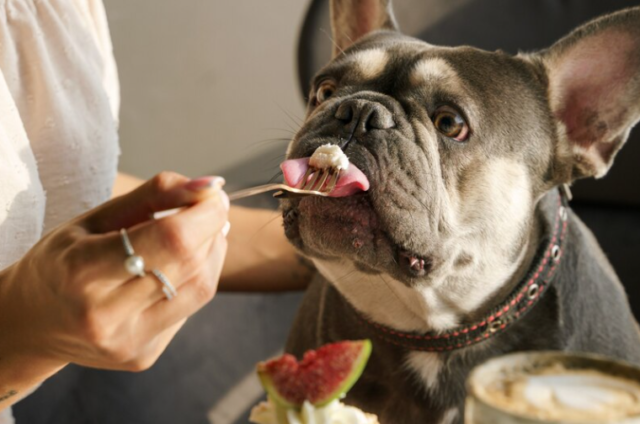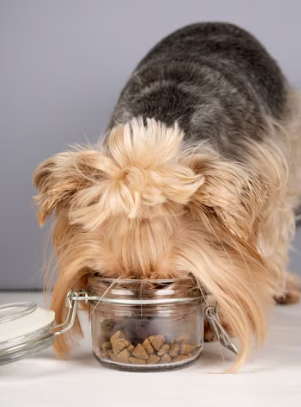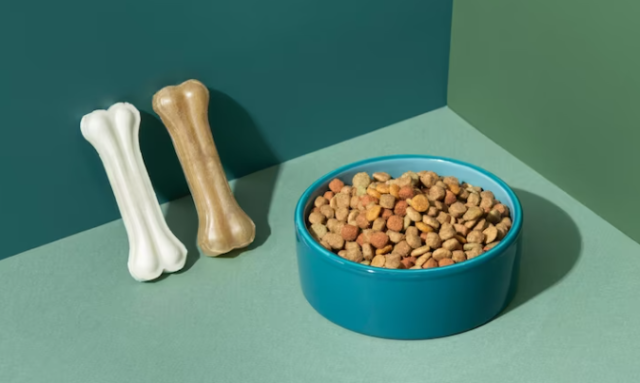Introduction
Bringing a German Shepherd puppy home is an exciting moment, and ensuring that they receive the proper diet is essential for their growth and development. With so many alternatives on the market, choosing the finest dog food for your German Shepherd puppy can be challenging. In this article, we’ll go through the essential criteria to look for when choosing a premium dog food that is tailored to your German Shepherd puppy’s needs.

1. Understanding the Nutritional Needs of German Shepherd Puppies
German Shepherd puppies have unique dietary requirements that should be met to ensure their optimal health and well-being. These intelligent and active puppies require a balanced diet that promotes proper bone and muscle development while supporting their energetic lifestyle.
2. High-Quality Protein for Strong Muscles and Growth
German Shepherd puppies’ growth and development depend heavily on protein. Try to choose dog diets that have high-quality animal protein sources, such as lamb, chicken, or turkey. These nutrients, which are high in protein, help your dog grow generally and develop powerful muscles.
3. Essential Fatty Acids for Healthy Skin and Coat
Despite the fact that this guidebook is filled with helpful suggestions, it is always advisable to consult your veterinarian before making any significant nutritional changes for your German Shepherd puppy.

4. Balanced Calcium and Phosphorus Levels for Bone Health
Proper bone development is crucial for German Shepherd puppies, as they are prone to certain skeletal issues. Ensure the dog food you choose contains balanced levels of calcium and phosphorus, as this will promote healthy bone growth and minimize the risk of bone-related conditions.
5. Digestibility and Probiotics for Optimal Digestive Health
A puppy’s digestive system is delicate and requires easily digestible ingredients. Look for dog foods that contain high-quality, easily digestible proteins and fiber sources. Additionally, incorporating probiotics into your puppy’s diet can promote healthy gut flora and enhance overall digestion.
6. Avoiding Common Allergens and Fillers
Avoiding common allergies like maize, wheat, and soy is vital since German Shepherds might be sensitive to specific components. Some puppies may develop allergies or digestive problems as a result of these components. Choose dog diets made with authentic, healthful ingredients and steer clear of extraneous fillers or synthetic additives.
7. Feeding Guidelines and Portion Control
Establishing proper feeding guidelines and portion control is essential to maintain a healthy weight for your German Shepherd puppy. Follow the recommended feeding instructions provided by the dog food manufacturer, but also consider your puppy’s individual needs, activity level, and age.
8. Popular Dog Food for German Shepherd Puppies
To help you get started, here are some popular dog food brands known for providing high-quality nutrition for German Shepherd puppies:
9. Transitioning to a New Dog Food
When switching your German Shepherd puppy’s diet, it’s important to do so gradually to avoid digestive upset. Start by mixing small amounts of the new dog food with their current food and gradually increase the proportion of the new food over the course of a week. This gradual transition allows your puppy’s digestive system to adjust to the new diet more easily.
10. Consulting with Your Veterinarian
Even though this manual contains useful advice, it is always advised to speak with your vet before making any big dietary modifications for your German Shepherd puppy. Your vet can assess your puppy’s specific nutritional needs and provide personalized recommendations based on their health condition and individual requirements.
Conclusion
The special nutritional requirements of your German Shepherd puppy must be carefully taken into account while selecting the best dog food. You can provide your puppy the nutrition they require for optimum growth and development by giving high-quality protein sources, vital fatty acids, balanced calcium and phosphorus levels, and digestibility first priority.
FAQs
Q1: How often should I feed my German Shepherd puppy?
German Shepherd puppies generally require three to four meals a day until they are about six months old. After that, you can gradually transition to feeding them twice a day.
Q2: Can I feed my German Shepherd puppy a raw food diet?
While some dog owners opt for a raw food diet, it's crucial to ensure proper balance and nutritional completeness. Consult with your veterinarian before considering a raw food diet to ensure your puppy's dietary needs are adequately met.
Q3: How do I know if the dog food is suitable for my German Shepherd puppy?
Look for dog foods that are specifically formulated for puppies and mention the breed-specific needs of German Shepherds. Additionally, checking the ingredients list and consulting with your veterinarian can help determine if the food meets your puppy's requirements.
Q4: Should I consider grain-free dog food for my German Shepherd puppy?
Grain-free dog food can be an option if your puppy has specific grain allergies or sensitivities. Your veterinarian must be consulted, though, to make sure the food is balanced and contains all the required nutrients.
Q5: When can I switch my German Shepherd puppy to adult dog food?
It is generally recommended to switch to adult dog food around 12 to 14 months of age. However, the transition may vary depending on your puppy's individual growth and development. Consult with your veterinarian for personalized advice.
Read also
- Guide to Choosing Canned Dog Food for Sensitive Stomachs
- Find the Best Dog Food for Your German Shepherd
- Discover the Fascinating History of the Oldest Dog Breed
- Top 10 Must-Have Dog Camping Gear for Your Next Adventure
- Your Pitbull’s Skin Allergies Can’t Wait!
- Top 10 Dog Toys for Aggressive Chewers | Keep Your Dog Busy
- Dog Barking Sound: Understanding and Addressing Canine Vocalization
- Stop Your Dog Jumping Habits with These Effective Techniques
- Top 10 Best Large Dog Car Seats for Safe Travel in 2023
- Unraveling the Mystery: Why Is Your Dog Chewing His Paws?
- 7 Basic Dog Commands: A Guide to Training Your Pup
- Unveiling the Alluring Sandlot Dog Breed: A Perfect Blend of Charm and Playfulness
- Unlock Duck Hunting Secrets: Most Effective Dog Breeds
- Unveiling the Charms of Chug Dog Breed: A Perfect Blend of Cuteness and Companionship
- Organic Puppy Food: A Guide to Feeding Your Furry Friend
- Effective Strategies to Stop a Dog from Jumping Up | Expert Advice
- Lion Dog Breed: A Perfect Blend of Beauty and Grace
- Discover the Enchanting Teddy Bear Dog Breed: A Perfect Companion for All Ages
- Discover the Versatile Mountain Cur Dog Breed | All You Need to Know
- Stop Dog Barking: Effective Techniques to Prevent Barking at Other Dogs






